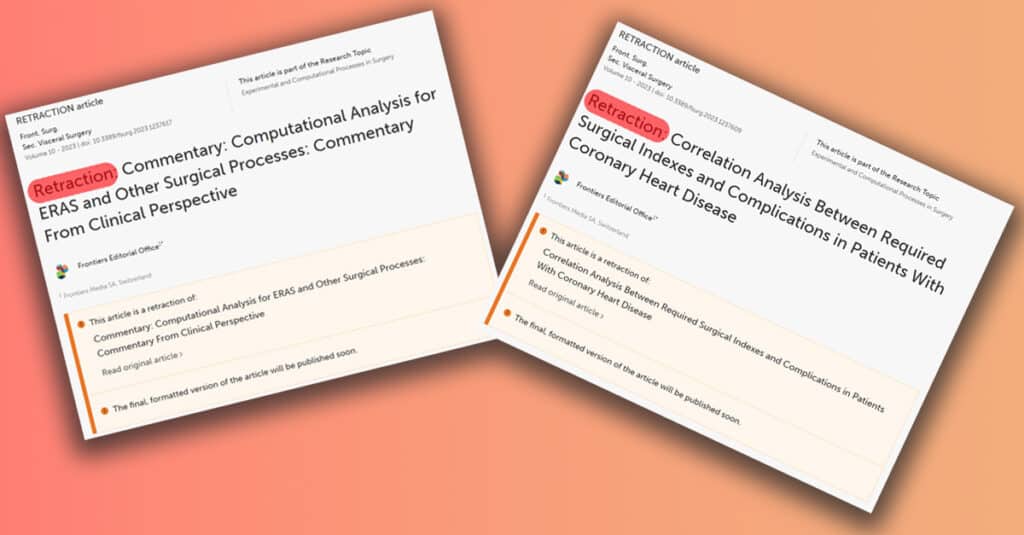This article asks what should happen if a paper is retracted? We focus on a couple of Frontiers publications, only as these caught our attention, but the same arguments can be used for many other retracted papers.
We would like to thank, and acknowledge, Nick Wise who posted on Twitter about the Frontiers’ cases we are reporting here. You can follow Nick’s Twitter account here.
The two retracted papers
The two retracted papers, that we focus on in this article are:
Commentary: Computational Analysis for ERAS and Other Surgical Processes: Commentary From Clinical Perspective. This paper was received on 18 May 2022, accepted on 25 May 2022 and published on 14 June 2022. It was retracted on 9 June 2023. The retraction notice read:
“Following publication, the publisher uncovered evidence that several false identities were listed as authors for this article. During this investigation, the publisher was unable to confirm the institutions of the authors Hilla Mills, Ronald Glassen, Susanne Klenk, Nova Tang, or Luke Cheung. This investigation was conducted in accordance with Frontiers’ policies and the Committee on Publication Ethics (COPE) guidelines.“
Correlation Analysis Between Required Surgical Indexes and Complications in Patients With Coronary Heart Disease. The paper was received on 20 May 2022, accepted on 3 June 2022 and published on 6 July 2022. It was retracted on 9 June 2023. The retraction notice read:
“Following publication, the publisher uncovered evidence that several false identities were used in the peer-review process. The assignment of false reviewers was confirmed by an investigation conducted in accordance with Frontiers’ policies and the Committee on Publication Ethics (COPE) guidelines.
The investigation also uncovered concerns about the presentation and validity of the data in the article. The authors did not respond to contact regarding the data presented in the article.“
Reviewing your own papers?
It was a good spot by Nick Wise, to note that one of the retracted papers had been reviewed by two authors of the other retracted paper. Moreover, the reviewers were two of the fake authors.
Specifically, the second paper (Correlation Analysis Between Required Surgical Indexes and Complications in Patients With Coronary Heart Disease) of those listed above was reviewed by Hilla Mills and Luke Cheung who were authors of the first paper.
This means (we think) that the human authors of one paper, proposed fake reviewers for the other paper and when these fake authors were approached, the human authors reviewed their own paper.
This is obviously wrong, on many levels.
The web page that shows these reviewers has been archived here, just for the record.
Other papers by two of the fake authors
If we accept that Hilla Mills and Luke Cheung are fake authors, noting that the retraction report says “… the publisher was unable to confirm the institutions of the authors Hilla Mills or Luke Cheung“, which is slightly different to them not existing, we looked briefly at these authors.
Hilla Mills, has an ORCID profile, that shows 25 works (archived here). We could not find a Google Scholar profile. Searching Scopus, using the ORCID ID and author name, returned three articles by Hilla Mills.
Luke Cheung has an ORCID profile that shows 31 works (archived here). We could not find a Google Scholar profile. Searching Scopus, using the ORCID ID and author name, returned the same three articles by Luke Cheung, which were returned for Hilla Mills.
It is outside the scope of this article, but this is worthy of further investigation, as there seems to be a few authors in common with the three papers.
What should happen now?
It is good to see that these two papers have been retracted but should that be the end of the story? We think not.
Frontiers in Surgery (ISSN: 2296-875X), are members of both the Committee on Publication Ethics (COPE) and the Directory of Open Access Journals (DOAJ).
The publisher (Frontiers) is a member of the Open Access Scholarly Publishing Association (OASPA).
Frontiers in Surgery is indexed by Scopus (4,135 papers (10 June 2023), current CiteScore = 1.1) and Web of Science (4,105 papers published (10 June 2023), current Impact Factor = 2.568).
Given that one of its members has retracted a paper and clearly explained the reasons why, would it be reasonable for COPE, DOAJ, OASPA, Scopus and Web of Science to write to the journal/publisher asking them to provide further details about the retraction and ask i) what are they doing to stop this happening again and ii) what they are doing to check if there are other violations like these that need to be addressed.
Of course, these discussions may be going in, in the background (we are unaware of how these organizations operate). We do note that OASPA did look at Frontiers in 2015 when it issued a statement (archived here) saying that
“We are aware that concerns have recently been expressed about the publisher Frontiers, which is a member of OASPA.
We have discussed the situation with Frontiers, who have been very responsive in providing us with information on their editorial processes and explaining their procedures. In light of these responses, the Membership Committee remains fully satisfied that Frontiers meets the requirements for membership of OASPA.“
If there any discussions going on, we welcome that. It would be useful (in the spirit of open science) to make the findings and follow up actions publicly available, not just for this case, but any others that arise.
Final Thoughts
One of the questions we are often asked is “What can we do about it?“, where “it” refers to paper mills, predatory publishing, inappropriate citations, selling of authorships etc.
It is often the case that there is no higher body who can take action but, in this case, there are organizations that have a role to play in policing what is published in the scientific literature.
We hope, that when there is something that can be done, that the opportunity is taken and that all stakeholders work together to stop unethical behaviour.


